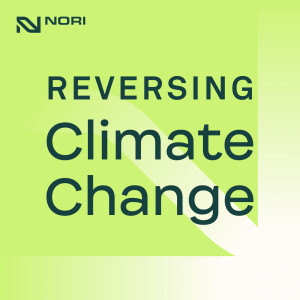
S2E7: Why is soil carbon measurement so tricky?—w/ Dr. Jane Zelikova of Carbon180
 2020-04-07
2020-04-07
At Nori, we’re interested in helping people get paid for carbon sequestration, including the farmers and ranchers implementing soil health practices. But as much as scientists have learned about how to quantify soil carbon, there is still a lot left to be done. So, what can one do to 1) help support the producers who are interested in sequestering CO2, and 2) compensate them for the work they do?
Dr. Jane Zelikova is the Chief Scientist at Carbon180, a carbon removal think tank on a mission to fundamentally rethink carbon, and cofounder of 500 Women Scientists, a nonprofit dedicated to transforming the leadership, diversity, and public engagement in science. On this episode of the Reversing Climate Change, Jane joins Ross and Christophe to share her ecologist’s perspective on climate math. She discusses the challenges of measuring the carbon content of soil and the projections around how much CO2 we can sequester with improved management practices.
Jane describes her time working with farmers and ranchers in the West, explaining what she learned about the challenges they face in implementing soil health practices and why it’s so much harder to measure carbon sequestration on rangeland versus cropland. Listen in for Jane’s critique of capitalism as a framework for climate solutions and learn how you can be a part of the work 500 Women Scientists is doing to make the field inclusive and accessible to everyone.
Key Takeaways
[5:53] An ecologist’s perspective on climate math
Stop additional emissions over and above carbon cycle Remove emissions in atmosphere (since Industrial Revolution)
[10:02] The top trends in the soil carbon space
People discussing, looking for ways to pay for carbon sequestration Understand and improve or optimize what microbes already doing
[13:18] The challenges around measuring the carbon content of soil
Takes significant time and effort to measure Can’t quantify at scale needed to describe variation in contexts
[16:24] How much CO2 we can sequester with improved management practices
Some studies estimate land sink at 900 Tg-C per year Potential for 100 Tg-C per year via US cover crops in next 5 years
[20:42] What producers need to implement soil health practices
Access to technical assistance and education Science infrastructure (collect data and track outcomes) Business and policy incentives
[27:19] The controversy re: measuring carbon sequestration on rangelands
Easier to collect data across field borders vs. grazing systems Can’t confirm grazing management practices yield strong carbon benefits
[32:24] How weather and geography influence soil dynamics
Soil is living system with carbon going in and out Organisms respire more in warmer climates
[37:54] Jane’s criticism of using capitalism as a framework for climate solutions
Potential for furthering system that created problem Trends toward tech solutions, disregards socioeconomic challenges Solutions must be accessible to everyone, not just wealthy
[47:20] The origin story and evolution of 500 Women Scientists
Began with open letter written in response to 2016 election Grew into nonprofit organization with 400 chapters worldwide Change system so science is inclusive and accessible to all
[52:18] The idea that science aspires to a standard of objectivity
Scientists inherently biased, influenced by culture and worldview Questions we’re asking in and of themselves inherently biased
Connect with Ross & Christophe
Nori
Nori on Facebook
Nori on Twitter
Nori on Medium
Nori on YouTube
Nori on GitHub
Nori on Patreon
Nori Newsletter
Email podcast@nori.com
Nori White Paper
Subscribe on iTunes
Carbon Removal Newsroom
Resources
Carbon180
Carbon180 on Medium
Carbon180 on Twitter
Jane on Twitter
500 Women Scientists
500 Women Scientists on Twitter
No Place Like Home Podcast
AAAS Science & Technology Policy Fellowships
DOE Office of Fossil Energy
Fargione Paper in Science Advances
David Roberts on RCC S2EP03
UT’s Leafcutter Ant Research Lab
More Episodes
Create your
podcast in
minutes
- Full-featured podcast site
- Unlimited storage and bandwidth
- Comprehensive podcast stats
- Distribute to Apple Podcasts, Spotify, and more
- Make money with your podcast
It is Free
- Privacy Policy
- Cookie Policy
- Terms of Use
- Consent Preferences
- Copyright © 2015-2024 Podbean.com






